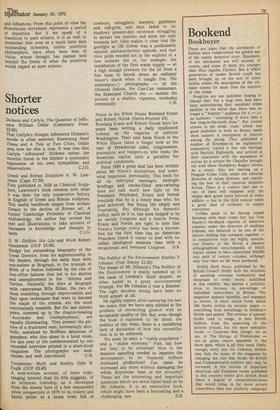Shorter notices
Dickens and Carlyle, The Question of Influence William Oddie (Centenary Press £2,80) That Carlyle's thought influenced Dickens's novels is often asserted. Examining Hard Times and A Tale of Two Cities, Oddie sees how far this is true. It was less that Carlyle ' influenced ' Dickens: rather, the novelist found in the thinker a systematic expression of his own sympathies and observations. C.J.G.
Greek and Roman Sculpture A. W. Lawrence (Cape £7.50) First published in 1929 as Classical Sculpture, Lawrence's book remains now what it was then: the only consecutive history in English of Greek and Roman sculpture. This useful handbook ranges from archaic Greece to the decline of Roman art. A former Cambridge Professor of Classical Archaeology, the author has revised his text and illustrations to take account of Increases in knowledge and changes in taste. C.J.G.
0. W. Griffith: His Life and Work Robert Henderson (OUP £3.00).
Stodgy but painstaking biography of the Great Director, from his apprenticeship in the theatre, through the early days with one-reelers at Biograph, to the triumph of Birth of a Nation followed by the run of box-office failures that -led to his decline and unemployment in the thirties and 'forties. Naturally the days at Biograph With cameraman Billy Bitzer, the two of them stumbling through improvisation and flair upon techniques that were to become the staple of the cinema, are the most continuously readable. But the last sixteen Years, summed up in the chapter-heading 'Accolades and Unemployment,' are equally illuminating. They present the picture of a frustrated man, increasingly alcoholic, sustained by Reithian delusions of grandeur, who dies alone in a hotel room, his last year of life commemorated by one recorded interview printed in a short-lived Magazine. The photographs are well chosen and well reproduced. C.H.
Tombstone: Myth and Reality Odie B. Faulk (OUP £3.45) A well-written account, of more wideranging interest than its title suggests, of an Arizonan township, as it developed from the shanty huts of a few resourceful Silver prospectors in 1878 to its violent and hectic prime as a boom town full of cowboys, smugglers, lawyers, gamblers and call-girls, and then faded to its shadowy present-day existence struggling to attract the tourists and mine the only bonanza left. Odie makes it clear that the gunfight at OK Corral was a particularly squalid, uncharacteristic episode, and that civic pride resided not in the exploits of a few outlaws but in, for example, the installation of the first water supply — at a high enough pressure for the jet from a fire hose to knock down an ordinary miner's shack when it caught fire. The contempora:y photographs — of the Oriental Saloon, the Can-Can restaurant, the Episcopal Church etc — sustain the picture of a shabby, vigorous, workaday community. C.H.
Nixon in the White House Rowland Evans and Robert Novak (Davis-Poynter £5) Rowland Evans and Robert Novak have for years been writing a daily syndicated column on the vagaries of political Washington. Their new book Nixon in the White House takes a longer look at the cast of Presidental aides, congressmen, journalists and hangers-on who make the American capital such a paradise for political columnists.
Since 1968 a great deal has been written about Mr Nixon's mysterious, and somewhat imperious, personality. This book for all its teletyped messages, midnight briefings and smoke-filled arm-twisting does not cast much new light on the President. Perplexed, Evans and Novak conclude that he is a lonely man who, his goal achieved, has found life empty and frustrating. But although his domestic policy, such as it is, has been hedged in by an unruly Congress and a hostile Press, Evans and Novak are right to note that Nixon's foreign policy has been a success. Not for the first time has an American President found it easier to deal with socalled ideological enemies than with a recalcitrant and bemused Congress. D.B.
The Politics of the Environment Stanley P. Johnson (Tom Stacey £2.95) The theme of Mr Johnson's Thg Politics of the Environment is neatly summed up in the issue of London's third airport, so often hailed as a great environmental triumph. For Mr Johnson it was a disaster. The right decision would have been no third airport at all.
He rightly argues, after surveying the last ten years, that we have only nibbled at the problem of reconciling growth with an acceptable quality of life. But, even though the book is supposed to be about the politics of this issue, there is a tantalising lack of discussion of how this reconciliation is to be achieved.
We need, he says, a "stable population " and a "stable economy." Fine, but how are they to be achieved? How is the massive spending needed to improve the environment to be financed, without increased production? Can taxes be increased any more without damaging the whole Keynesian base of the economy? These are the interesting and important questions which are never faced head on by Mr Johnson. It is an instructive book, which might have been a fascinating and a challenging one. D.B.


































 Previous page
Previous page